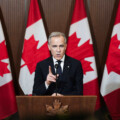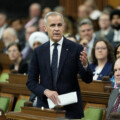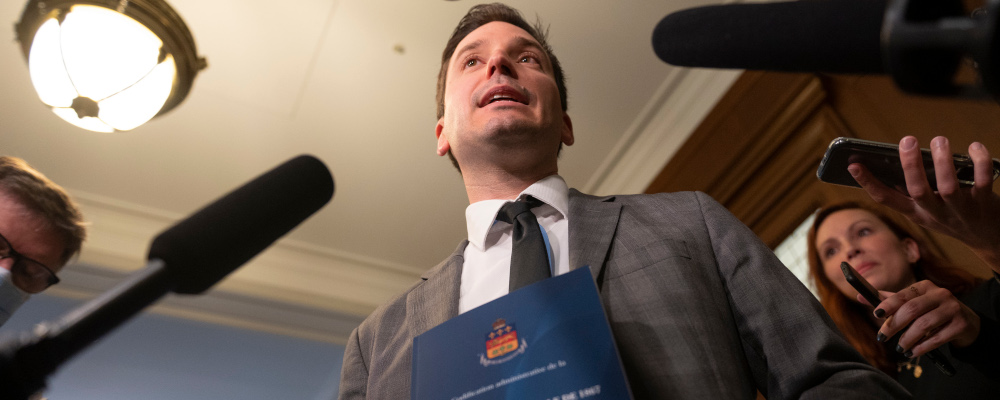In a recent podcast interview, my American host asked me to comment on whether Canada constituted a nation, in the substantive sense. Beyond platitudes such as a shared commitment to multiculturalism, general good government, and a thin conception of liberty, there is not much there there, I reflected. No, there isn’t really a singular Canadian nation, I answered.
But I was oversimplifying: the fact is that Canada is a nation that contains many nations. The compromises of federalism as set out in the Constitution were specifically designed to accommodate the vast regional and cultural differences across our equally vast land and, for the most part, have held up well.
However, proposals in Alberta and Quebec are starting to nip at the fabric of our constitutional order. Both provinces are, as one academic recently put it, apparently treating the Constitution as a “buffet that one can pick and choose from”, rather than a blueprint for how power flows in a state.
Let’s take the Quebec s. 96 French language law example: the Legault government’s bill declares French to be the province’s sole official language,An Act respecting French, the official and common language of Quebec http://m.assnat.qc.ca/en/travaux-parlementaires/projets-loi/projet-loi-96-42-1.html bluntly contradicting the Constitution Act’s promise of a bilingual Canada, not to mention the core synthesis and post-bellum political compromise of Confederation.
The bill makes no mere symbolic declaration. Nor does it limit its intrusions to public displays of language such as business and street signage, but purports to regulate private workplaces and conversations. The bill permits the Office québécoise de la langue française the power to enter any building other than a “dwelling house” where there are activities governed by the language law, or where documents or property related to it “may be held,” to get information. It’s a sweeping assault on civil liberties, insulated from judicial review by the notwithstanding clause.
Most brazen from the perspective of constitutionalists, though, is Bill 96’s article 159, which seeks to unilaterally amend section 90 of the Constitution Act, 1867CONSTITUTION ACT, 1867 https://laws-lois.justice.gc.ca/eng/const/page-1.html by inserting the following provisions:
90Q.1. Quebecers form a nation.
90Q.2. French shall be the only official language of Quebec. It is also the common language of the Quebec nation.
To be clear, a constitutional amendment cannot be unilateral, even if it applies to sections of the constitution that pertain specifically to one province, as the PM sheepishly suggested. The core raison d’être of a constitution is to create a mutually-binding aggregate of core principles, which if altered in part is altered for all consenting parties.
And then there’s the matter of the Alberta Sovereignty Act which United Conservative Party leadership candidate Danielle Smith recently announced she would introduce if elected Premier. The Act starts from the premise that the application of federal jurisdictional authority is an elective matter and that Alberta can simply opt out where the federal law “interfere[s] with provincial areas of jurisdiction or constitute an attack on the interests of Albertans.”
In other words, the Act would, by sheer political fiat, circumvent the constitutional division of powers into federal jurisdiction (s. 91) and provincial jurisdiction (s. 92), wherever “Alberta interests” were thought to dictate accordingly.
The proposal includes a made-in-Alberta police force, pension plan, scheme for unemployment insurance, and banking regulations.The Free Alberta Strategy https://www.freealbertastrategy.com/the_strategy These proposals range in effect from unlikely to make Albertans any more independent (the presence of the OPP in Ontario, for example, doesn’t render Ontario closer to a sovereign unit), to inviting a superfluous double-layer of bureaucracy: creating an Alberta unemployment insurance program will not eliminate the fact that employment insurance is a federal program, and employers who fail to remit to it will risk federal enforcement actions.
Of course, recognizing that regulations under the hypothetical Alberta Sovereignty Act would inevitably end up in court for judicial review, the proposal, most stridently, also provides for an Alberta Judicial Independence Act, which establishes judicial appointments for all provincial judges.
First, this is blatantly contradictory to the Constitution Act’s s. 96, which makes the Governor-General and federal government responsible for all judicial appointments. Second, if the objective of the proposal is to ensure that the bench is filled with judges who have a similarly novel view of enforceability of federal laws as the authors of the Sovereignty Act— i.e., that Alberta can simply refuse to enforce them— it’s not likely to succeed. I wonder if the drafters of this proposal have met any judges, as they are not generally known for their rank groupthink nor their flippancy about settled bedrock principles, in Alberta or anywhere else.
If these provincial would-be rebels are interested in actually rolling back federal incursions into their jurisdiction rather than playing political brinkmanship, there are other places they might look. Federal power has metastasized beyond the original intention of the constitutional division of powers, and there are serious arguments to be made that the provinces can properly carve out more room to maneuver than they currently enjoy under the guarantees of the Constitution Act.
The Supreme Court’s 2021 Reference re Greenhouse Gas Pollution Pricing Act saw a sweeping federal carbon tax program that clearly interfered with matters of provincial property and civil rights to be a valid exercise of federal power using a lot of what has been called “judicial ad hockery” under the broad Peace, Order, and Good Government (POGG) power.
The Court may soon have opportunity to clarify the scope of POGG. Recently the Alberta Court of Appeal, in assessing the constitutionality of the federal Impact Assessment Act, also known as the “No More Pipelines” bill, made clear that “environment” is not a valid federal power, as the GGPA Reference seemed to imply. It concluded the Impact Assessment Act would “permanently alter the division of powers and forever place provincial governments in an economic chokehold controlled by the federal government.” The case is headed to the Supreme Court.
And in Quebec, the Attorney-General is challenging the constitutionality of an act governing Indigenous child services in which the federal government directed the provincial bureaucracy and executive on how to implement “national standards” within their own programs, effectively coercing the provinces into operationalizing a federal law. That case is also being heard at the Supreme Court this fall.
No doubt the twin phenomena of an overbearing federal government hovering over traditional provincial spheres of jurisdiction and defiant provincial governments declaring themselves exempt from the Constitution feed parasitically upon one another. The answer to restoring balance must be to return to the clarity and balance of the Constitution, rather than force a constitutional crisis for flagrantly political ends.
Recommended for You

The Weekly Wrap: Abandoning Trudeau’s economic agenda is a good first step for the Liberals

Sam Routley: With DEI dustups and growing funding uncertainties, it’s fair to ask: what are universities for anymore?

Michael Bonner: It’s time to totally overhaul Canada’s immigration system

Chart Storm: Three charts on the stark decline in summer job postings causing sky-high youth unemployment




